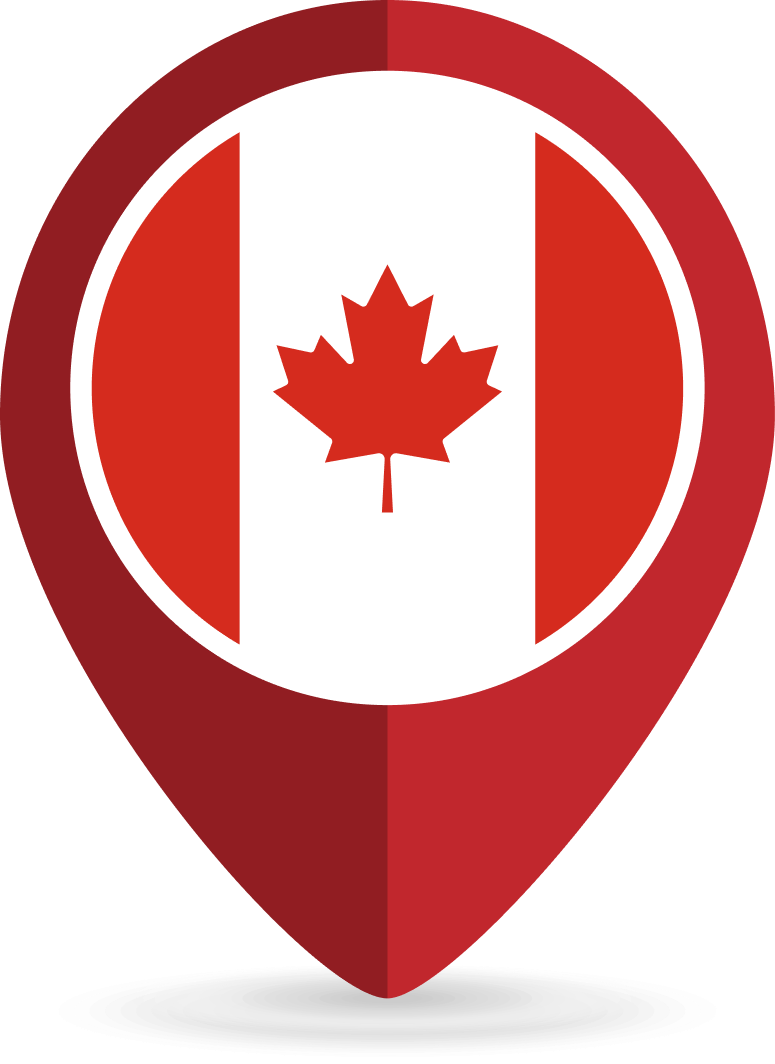Study in Canada: A Guide for International Students
What Are My Chances of Becoming an International Student in Canada?
The population of international students in Canada continues to experience steady growth each year. A significant number of these students are able to remain in Canada upon completing their studies.
The decision to approve a Canadian study permit rests solely with the visa officer.
In the previous year, Canada welcomed over 400,000 international students. Among them, the largest influx originated from France, Nigeria, China, Japan, South Korea, the United States, Brazil, Iran, India, and Vietnam.
Promoting diversity among international students is a key priority for the Canadian government. To further this objective, the government introduced the International Education Strategy (IES) known as “Building on Success” in 2019.
To support this initiative, the government has allocated a budget of $147.9 million over the next five years.
International Student Document Checklist
1. Acceptance Letter
A letter issued by the school confirming your admission to the program you intend to study.
2. Proof of Financial Support
Documentation demonstrating your financial capability to support yourself and any accompanying family members. This includes evidence of funds to cover tuition fees and living expenses (such as accommodation and food) for the first year in Canada.
3. Identity Documents
Essential identification documents including your birth certificate, marriage certificate (if applicable), and passport.
What is a Canadian Study Permit?
A Canadian study permit is a vital document that grants you permission to pursue your studies at a recognized Designated Learning Institution (DLI) in Canada.
Upon receiving an acceptance letter from a DLI, you become eligible to apply for a Canadian study permit.
What is the Application Process for a Canadian Study Permit?
1. Check your eligibility: Ensure that you meet the eligibility criteria for a Canadian study permit. You will need the following:
- An acceptance letter from a Designated Learning Institution (DLI).
- Proof of financial support.
- Supporting documents (requirements may vary based on your country of citizenship and residence).
- Electronic application: Create an account on the Immigration, Refugees and Citizenship Canada (IRCC) website and submit your application electronically using scanned or electronic copies of the required documents.
- Paper-based application: Collect hard copies of your documents and mail them to the Visa Application Centre (VAC) designated for your country.
How Long Does it Take to Apply for a Canadian Study Permit?
The processing times for study permits can vary significantly and are contingent upon your country of residence.
The shortest processing time for study permits is typically around 1-2 weeks. However, it’s important to note that some applicants may experience longer waiting periods, with processing times extending up to 16 weeks. These variations in processing times are influenced by the volume of applications received by the immigration authorities. It’s worth considering that applying close to the beginning of Canada’s academic year may lead to potential delays due to increased application volumes.
What Are the Conditions of a Canadian Study Permit?
1. Enrollment at a Designated Learning Institution (DLI):
You must be enrolled as a student at a designated learning institution recognized by the Canadian government.
2.Part-time or full-time enrollment:
You must be enrolled as a student at a designated learning institution recognized by the Canadian government.
3. Authorized leaves:
You must not take any authorized leaves longer than 150 days from your program of study. It is essential to maintain continuous enrollment and actively progress in your studies.
How Much Does it Cost to Study in Canada?
The good news is that studying in Canada is known for its affordability. Canadian tuition fees are generally lower compared to popular study destinations such as Australia, the United States, and the United Kingdom.
In the 2018/2019 school year, the average annual tuition for undergraduate international students in Canada was $27,159 CAD. By comparison, the average tuition for the same period at an American university was approximately $45,950 USD.
To get a better understanding of the tuition costs for specific college and university programs in Canada, as well as estimates for books and supplies, you can utilize the available tool designed for this purpose.
It’s worth considering that in addition to tuition fees, the cost of living is an essential factor to consider when choosing where to study abroad. Fortunately, the cost of living in Canada is generally more affordable compared to many other popular destinations for international students.
| Country | Average Annual Tuition & Cost of Living (USD) |
|---|---|
| Australia | $42,093 |
| United States | $36,564 |
| United Kingdom | $35,045 |
| Canada | $29,947 |
Cost of Canadian Student Housing
When it comes to living as a student in Canada, there are various options available, allowing students to choose a living style that best suits their preferences. From university residences to apartment rentals, students have flexibility in their choices. However, it’s important to note that housing costs can vary depending on the location, with larger cities like Toronto and Vancouver generally having higher housing expenses compared to smaller cities and towns.
For example, the University of Toronto, which accommodates a significant number of international students, provides an estimated monthly housing cost ranging from $1,080 to $2,982 CAD for students residing in downtown Toronto.
In Montreal, the cost of living is relatively low compared to other major North American cities. The University of Montreal estimates a monthly student housing cost of $550 CAD. Montreal remains a highly popular study destination for international students and was recently ranked fifth in the world for the best study destination.
In Saint John’s, Newfoundland, one of Canada’s smaller cities, the cost of living is notably lower, ranging from 10% to 30% less compared to other Canadian cities. The average monthly cost of renting a two-bedroom apartment is only $710 CAD, or $350 per room.
It’s essential for students to consider their budget and personal preferences when choosing their living arrangements in Canada. Additionally, exploring housing options and consulting with the respective universities or local housing services can provide more specific information tailored to individual needs.
Food and Transportation costs
The cost of food and transportation can vary between provinces in Canada. Let’s explore the prices of amenities in the three examples mentioned above, all in Canadian dollars:
Toronto:
- Local transportation: $122.45 per month
- Basic lunchtime menu in the business district: $17.00
- Suggested monthly grocery budget: $200.00 to $400.00
Montreal:
- Local transportation: $80 per month
- Basic lunchtime menu in the business district: $16.00
- Suggested monthly grocery budget: $350.00
Saint John’s:
- Local transportation: $78.00 per month
- Basic lunchtime menu in the business district: $18.00
- Suggested monthly grocery budget: $240.00
Health Insurance
Healthcare coverage is a crucial requirement for all international students studying in Canada. However, the availability and coverage of healthcare can vary depending on the province or territory.
In certain provinces, international students are automatically granted access to Canada’s public healthcare system. This means they can benefit from the same healthcare services as Canadian citizens and permanent residents. However, in provinces where public healthcare coverage is not provided to international students, they are required to obtain private health insurance.
Many educational institutions in these provinces offer health insurance plans specifically designed for international students. These plans are typically offered as part of the tuition and student fees and provide coverage for various medical services and treatments.
It is important for international students to familiarize themselves with the healthcare coverage requirements and options available in the province or territory where they plan to study. The educational institution will usually provide information and guidance regarding health insurance options and the necessary steps to obtain coverage.
By ensuring proper healthcare coverage, international students can access the necessary medical services and support during their studies in Canada.
Utilities (Monthly)
The cost of basic utilities for an 85m2 apartment in Canada, including electricity, heating, cooling, water, and garbage, is approximately 198.16 CAD per month. Along with that, a typical mobile phone monthly plan with calls and 25GB+ data from a CanadianSIM would cost around 40 CAD. This plan offers
- Unlimited Canada-wide calls
- Unlimited local and international text messaging (SMS)
- No Contract plan does not come with any set-up fees
- Caller ID and Voicemail
This flexible and comprehensive mobile plan ensures that you have the necessary communication tools while living in Canada.
For internet service with a speed of 60 Mbps or more, unlimited data, and cable/ADSL connection, the average monthly cost is approximately 85.02 CAD. These expenses are important to consider when budgeting for your daily living expenses in Canada.
How to Study in Canada for Free
There are numerous scholarship opportunities available for international students aspiring to study in Canada. The availability of scholarships is contingent upon various factors such as the field of study or research and the applicant’s country of origin.
To explore and discover scholarship options that may be applicable to your specific circumstances, you can utilize a comprehensive database designed for this purpose. This database provides detailed information about various scholarships available to international students studying in Canada.
By utilizing the scholarship database, you can access valuable information about eligibility criteria, application requirements, deadlines, and the specific benefits offered by each scholarship program. It is recommended to thoroughly research and review the scholarships that align with your academic goals and personal situation.
Additionally, it is advisable to check with the respective Canadian educational institutions you are applying to, as they may have their own scholarship programs specifically tailored for international students.
With diligent research and preparation, you can increase your chances of securing a scholarship that can support your educational journey in Canada.
What is a Designated Learning Institution (DLI)?
A designated learning institution (DLI) refers to any educational institution in Canada that is authorized to enroll international students. It is important to note that while all primary and secondary schools in Canada are considered DLIs and can accept students from foreign countries, not all post-secondary schools have this designation.
Before applying to a post-secondary institution in Canada, it is crucial to verify whether it is listed as a DLI by checking the official list provided by the Canadian government. This list ensures that the institution is recognized and approved to enroll international students.
By confirming that your chosen post-secondary institution is a DLI, you can ensure that you meet the necessary requirements and eligibility criteria for international student enrollment. This helps to facilitate a smooth application process and provides reassurance that the institution is compliant with the regulations governing international student admissions in Canada.
What are the Different Types of Canadian Post-Secondary Schools?
Canada is well-known for offering accessible and high-quality education to international students. To determine which program is suitable for you, it is essential to understand the levels of study in Canada.
In Canada, any educational program pursued after completing twelfth grade is classified as post-secondary education. Post-secondary education encompasses various types of programs, each serving different purposes.
It’s important to note that specific programs may have their own unique admissions requirements that need to be fulfilled.
Our objective is to assist you in meeting the fundamental admissions prerequisites for the program(s) you are interested in applying to. By ensuring you meet these requirements, you can enhance your chances of securing admission to the desired program and institution.
Do I Need to Take the IELTS to Study in Canada?
Proficiency in English or French is a prerequisite for studying at a Canadian school. However, the language skill requirements for international students can vary among Canadian post-secondary institutions. Each school sets its own specific conditions.
When preparing your application, it is crucial to thoroughly research and understand the language skill requirements for your desired program. Some institutions may even offer English language courses that can be completed after you commence your studies.
It’s worth noting that certain international students may be exempt from providing proof of their language skills. For instance, if you come from an English-speaking country or have completed previous studies in English, you may not be required to take the IELTS (International English Language Testing System) or other language proficiency exams.
As language requirements can differ among schools, it is important to carefully review and adhere to the specific language requirements of the institution to which you are applying. This will ensure that you meet the necessary language criteria and increase your chances of a successful application.
Do I Need to Submit a Letter of Intent to Study in Canada?
Your letter of intent plays a crucial role in your study permit application for Canada. It serves as a means to communicate your intentions to study in the country and articulate your goals and aspirations. It is important to acknowledge and agree to the conditions associated with being a Canadian study permit holder in your letter.
The primary purpose of the letter of intent is to provide assurance to the Canadian government that you are committed to adhering to the conditions of your permit. This includes acknowledging your responsibility to leave the country once your permit has expired.
To support you in crafting a strong letter of intent, our international student program offers guidance and assistance. We can provide you with valuable insights and tips to help you write a compelling letter that showcases your genuine interest in studying in Canada and your understanding of the obligations that come with being a study permit holder.
By ensuring that your letter of intent is well-crafted and reflects your commitment to fulfilling the conditions of your permit, you can enhance the overall strength of your study permit application.
Do I Need to Submit a Letter of Intent to Study in Canada?
Your letter of intent plays a crucial role in your study permit application for Canada. It serves as a means to communicate your intentions to study in the country and articulate your goals and aspirations. It is important to acknowledge and agree to the conditions associated with being a Canadian study permit holder in your letter.
The primary purpose of the letter of intent is to provide assurance to the Canadian government that you are committed to adhering to the conditions of your permit. This includes acknowledging your responsibility to leave the country once your permit has expired.
To support you in crafting a strong letter of intent, our international student program offers guidance and assistance. We can provide you with valuable insights and tips to help you write a compelling letter that showcases your genuine interest in studying in Canada and your understanding of the obligations that come with being a study permit holder.
By ensuring that your letter of intent is well-crafted and reflects your commitment to fulfilling the conditions of your permit, you can enhance the overall strength of your study permit application.
When is the Deadline to Apply?
It is crucial to be aware of the application deadlines set by each individual school. To maximize your chances of acceptance, it is recommended to submit your application well in advance of these deadlines.
Canadian schools receive a significant number of applications each year, and as the deadline approaches, the competition becomes more intense. Reputable schools, in particular, tend to be highly competitive. Therefore, it is advantageous to submit your application as early as possible.
By submitting your application ahead of the deadline, you demonstrate your enthusiasm and preparedness, which can positively influence the admissions process. Early submission allows you to avoid any last-minute complications or delays that may arise.
To ensure a smooth application process and to give yourself the best possible opportunity for acceptance, it is advisable to research and note the specific deadlines for each school you are applying to and submit your application well in advance.
Which Canadian University is Right for Me?
Canada has a selection of post-secondary institutions of different sizes and specialties. Here’s a list of five of the country’s most recognized schools, and a description of each to help get you started!
- The University of Toronto (UofT) is renowned for its academic excellence and vibrant campus life. With approximately 20,000 international students, UofT attracts students from around the world. Situated in the heart of downtown Toronto, it offers a diverse and dynamic learning environment.
- The University of British Columbia (UBC) stands out as North America’s most international university. With a significant international student population of 16,188 students from 156 countries, UBC is located in Vancouver, a bustling city on Canada’s beautiful west coast. Choosing UBC means enjoying the perks of city life while also being close to nature, with easy access to stunning forests, ocean, and mountains.
- McGill University is globally recognized for its academic excellence and attracts more than 12,000 international students. Despite being located in the French province of Quebec, McGill is an English university. The city of Montreal, where McGill is situated, offers a vibrant artistic and cultural scene, making it a highly desirable place to live for students. Additionally, the cost of living in Montreal is relatively affordable.
- Université de Montreal (UdeM), located in Montreal as well, is one of Canada’s top-ranked universities and an excellent choice for those interested in studying in French. UdeM and its affiliated schools welcome 9,500 international students annually, offering a high-quality education in a French-speaking environment.
- McMaster University, ranked among the world’s top 100 universities, is located in Hamilton, Ontario, just an hour’s drive from Toronto. Hamilton is experiencing significant growth in the tech sector, making it an attractive destination for students interested in working during or after their studies.
Can I Change Schools or Programs While on a Study Permit?
These universities offer a wide range of academic programs, vibrant campus life, and access to diverse cultural experiences. Each institution has its own unique advantages, so it’s important to research and choose the university that aligns with your academic and personal goals.
To change your school or program with a Canadian study permit, follow these steps through the online portal:
- Sign in to your account.
- Locate the section labeled “Designated Learning Institution student transfer.”
- Click on “Transfer from DLI number.”
- Enter your study permit application number in the search field and click on “Search for my application.”
- You may be asked to provide additional details from your original study permit application, so ensure you have the necessary information readily available.
- Enter the information about your new program or school, including the new DLI number, your new student ID number, and the start date of your new program.
- Click on “Submit transfer.”
- Review all the information you have provided. If everything is accurate, confirm the transfer by clicking on “Confirm transfer.”
- You will receive a notification confirming that your request is complete. This signifies that you have successfully informed the government about your change in plans.
Can I Work While Studying in Canada?
Indeed, one of the advantages of studying in Canada is the opportunity for international students to work while pursuing their education. Here are some key points regarding work options for international students in Canada:
- Part-time Work: International students can work part-time, up to 20 hours per week, during school terms. This allows students to earn income to help cover their tuition and living expenses.
- Full-time Work: During scheduled breaks, such as summer vacation, international students are eligible to work full-time.
- Work Permit Requirement: In most cases, international students do not need a separate work permit to work while studying, whether the job is on or off campus. The conditions for working off campus will be specified on your study permit.
- Work Experience Programs: If your program of study includes work experience as part of the curriculum, you may have the opportunity to work more than 20 hours per week during the semester. This will be mentioned in your letter of acceptance. In such cases, you will be granted both a work permit and a study permit, but the work permit will only allow you to work on campus.
Can I Bring My Family With Me While I Study?
International students who are married or have children may choose to bring their family members with them to Canada. When applying for a study permit, you have the option to include your family members in the application. However, it’s important to be aware that the inclusion of family members may have an impact on the visa officer’s decision.
Can My Spouse Work While I am Studying in Canada?
If your family accompanies you to Canada, your spouse will be eligible to obtain an open work permit. This work permit will allow your spouse to work full-time in Canada while you pursue your studies. It provides an opportunity for your spouse to contribute to the family’s income and gain valuable work experience during your time in Canada.
Can I Study in Quebec?
Studying in Quebec provides the unique opportunity to pursue your education in either English, French, or both languages. However, it’s important to note that the student visa requirements for Quebec differ slightly from the rest of Canada.
Are International Students Covered by Canada’s Healthcare System?
Healthcare coverage is a mandatory requirement for all international students studying in Canada. While access to Canada’s public healthcare system varies by province, certain provinces do provide international students with access to the public healthcare system. In these provinces, international students can benefit from essential medical services and receive healthcare on par with Canadian residents.
However, there are provinces where international students are not eligible for public healthcare coverage. In such cases, international students are responsible for obtaining private health insurance to ensure they have adequate coverage during their stay in Canada. Canadian schools typically offer health insurance plans specifically tailored for international students to meet their healthcare needs.
It’s important for international students to familiarize themselves with the healthcare coverage available in the province where they plan to study and to ensure they have the necessary health insurance to protect their well-being while in Canada.
Can I Stay in Canada After I Graduate?
Canada offers favorable pathways for international students to become permanent residents if they choose to stay in the country after completing their studies.
One of these pathways is the Post-Graduate Work Permit (PGWP), which allows international students to work in Canada for a period of up to three years after graduating. This work permit provides an opportunity for international graduates to gain valuable Canadian work experience, which can enhance their future career prospects.
After working in Canada for a minimum of one year with a valid PGWP, international graduates may be eligible to apply for permanent residency through various immigration programs, such as the Canadian Experience Class (CEC) or the Provincial Nominee Program (PNP). These programs recognize the contributions and skills of international graduates and provide a pathway to permanent residency status.
To be eligible for a PGWP, it is crucial to demonstrate that you have complied with all the conditions of your study permit and that your primary activity in Canada was focused on your studies. The duration of the PGWP is typically aligned with the length of your program of study in Canada.
Obtaining a PGWP and subsequently applying for permanent residency can be an advantageous route for international students who wish to continue their career and settle in Canada permanently. It is recommended to stay updated with the immigration policies and requirements to make informed decisions regarding immigration pathways.
Related Posts



















